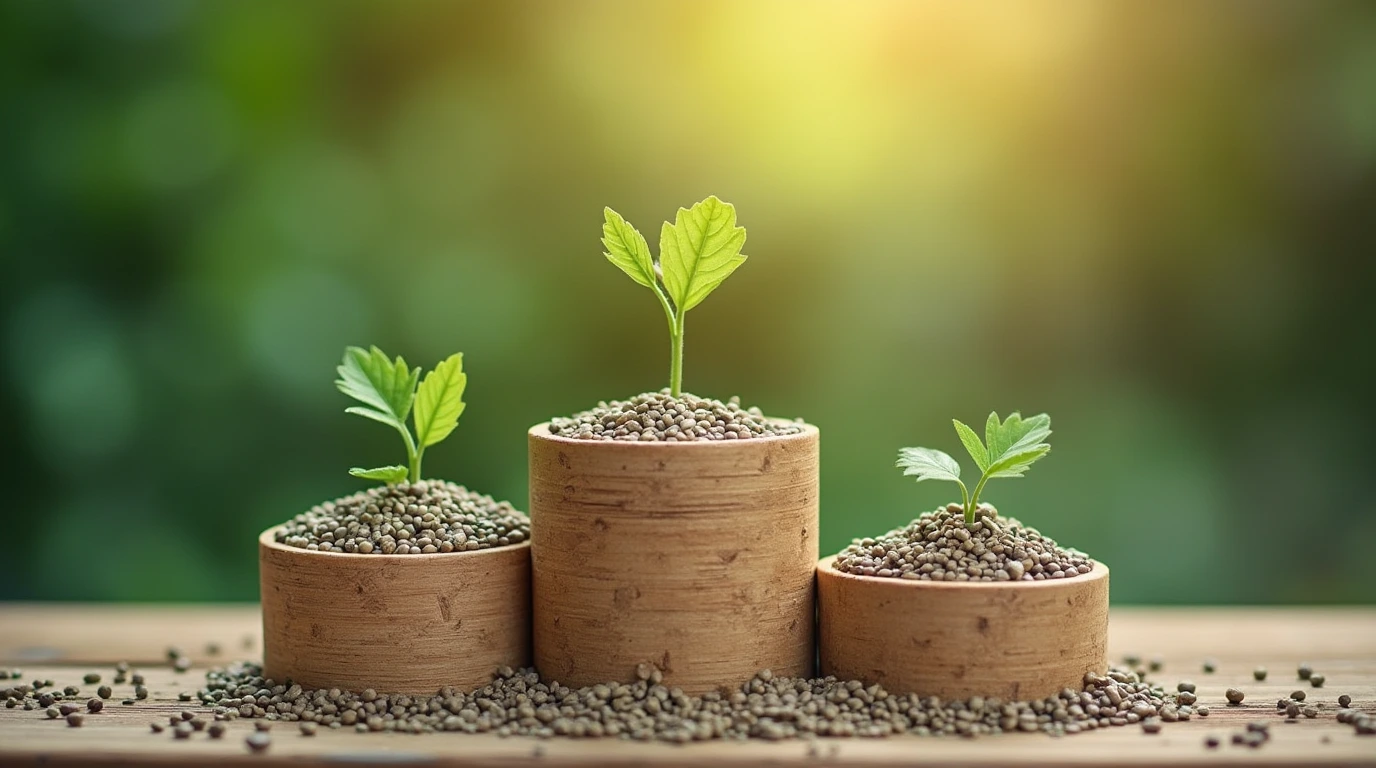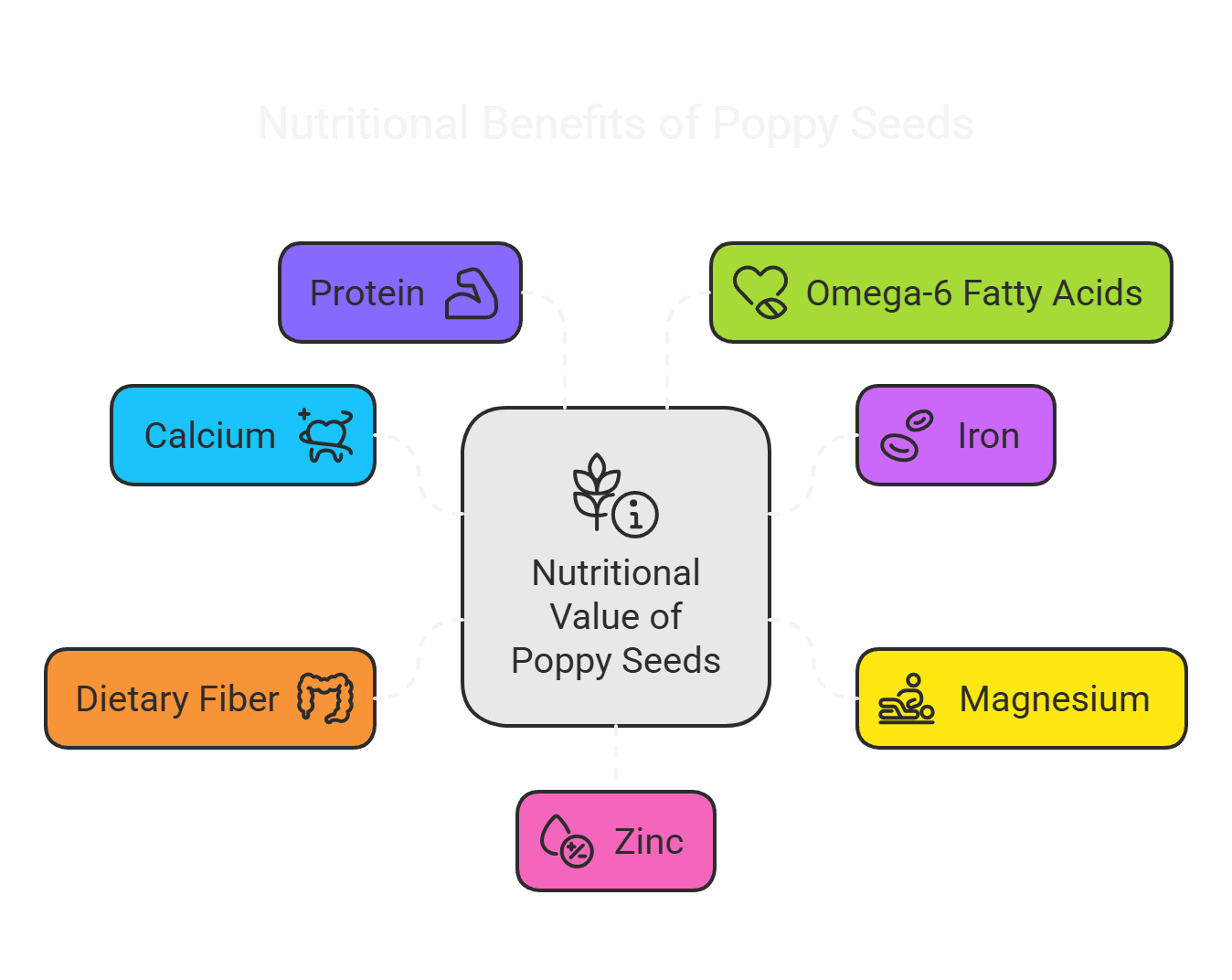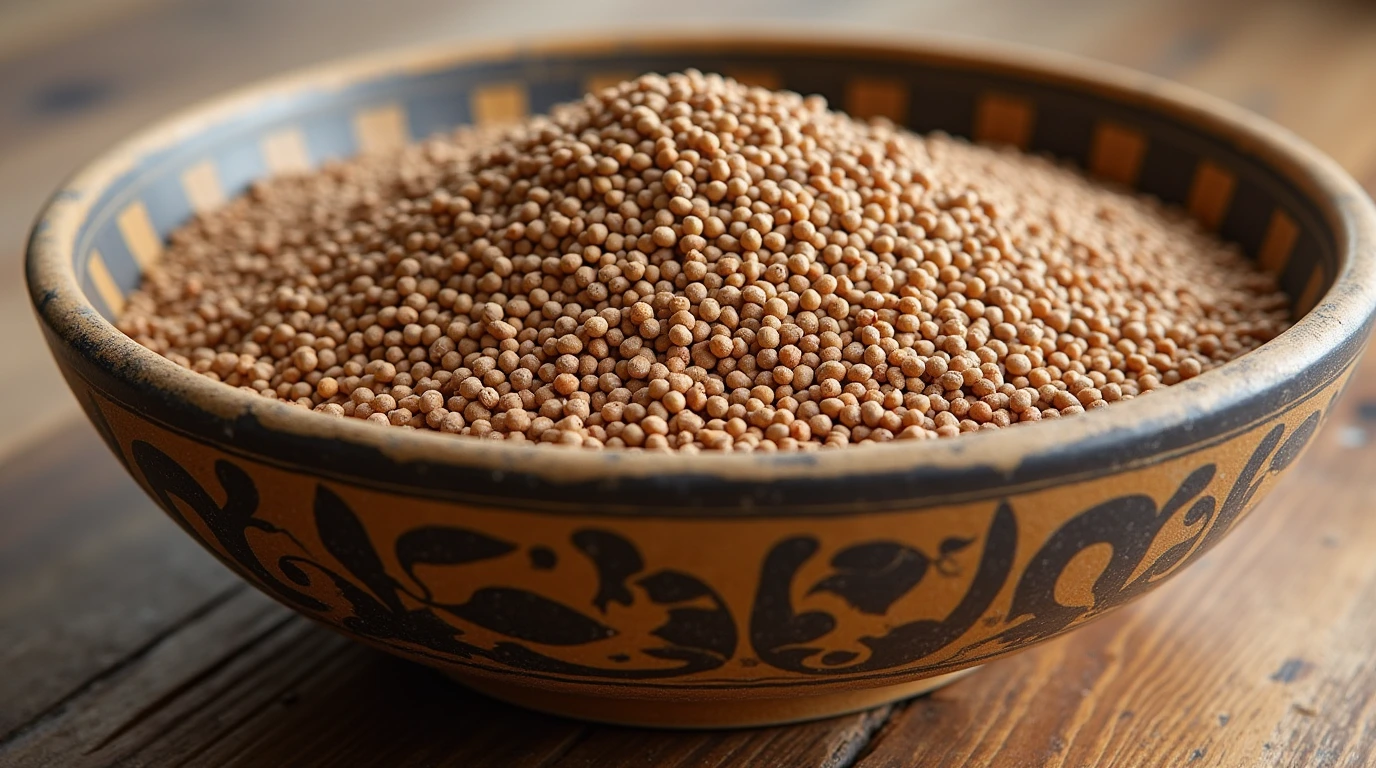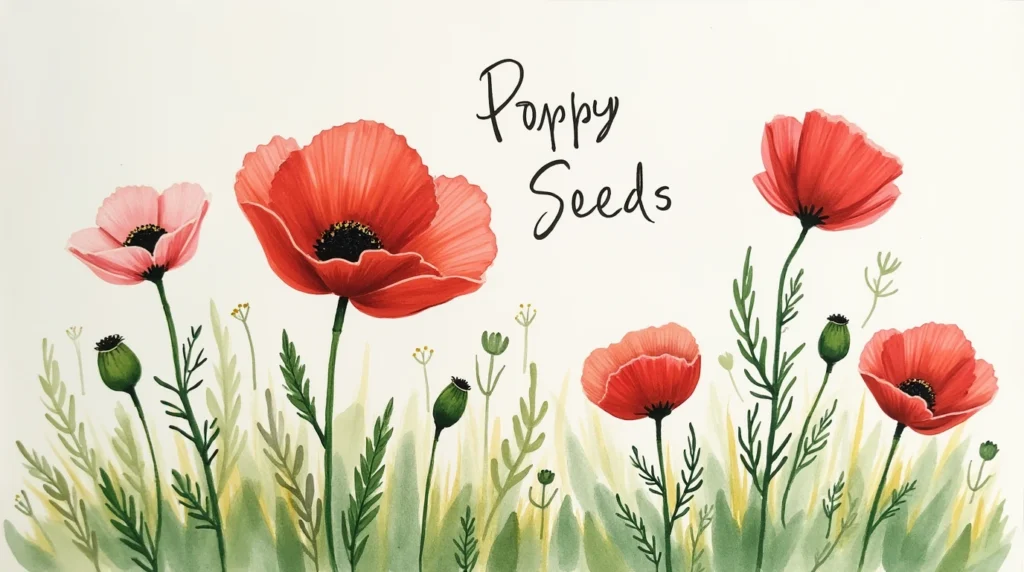So tiny, yet so powerful! Poppy seeds are those pretty little black or blue pearls we find in crispy breads, fragrant cakes, and even exotic dishes. They add a delightful crunch, bring beauty to our recipes, and above all… they’re packed with health benefits. Ready to unlock their secrets? 😍✨
For a search on Poppy Seeds, this is where you’ll find the essentials.😉

1. Health Benefits of Poppy Seeds 💚
1.1 Summary of Poppy Seed Benefits 🌿
Don’t let their size fool you! Poppy seeds are loaded with essential nutrients like calcium, iron, magnesium, fiber, and omega-6 fatty acids. They help strengthen bones 🦴, boost digestion 💨, calm the nervous system 🧘♀️, and maintain healthy skin. Plus, they’re rich in antioxidants that fight cellular aging. A true wellness gem… in a seed! 💫
1.2 Nutritional Value Table of Poppy Seeds 📊
| Nutrient | Amount per 100g | Health Benefits |
|---|---|---|
| Calcium | 1438 mg | Strengthens bones and teeth 🦷 |
| Iron | 9.76 mg | Fights fatigue and anemia 💪 |
| Magnesium | 347 mg | Relaxes muscles and nerves 🧘♀️ |
| Dietary Fiber | 19.5 g | Boosts digestion and gut health 🌾 |
| Protein | 18 g | Supports muscle mass 💪 |
| Omega-6 Fatty Acids | 28 g | Good for the heart and skin ❤️ |
| Zinc | 7.9 mg | Enhances immunity and healing ✨ |
For more details on carrots, see the

2.Simple Recipes Using Poppy Seeds 🍽️
- Lemon Poppy Seed Cake: Moist, tangy, and delightfully crunchy.
- Crunchy Poppy Seed Salad: Fresh and nutty with a touch of zing.
- Homemade Poppy Seed Rolls: Perfect for lazy Sunday brunches 🥯
- Polish Makowiec: A soft roll filled with sweet poppy seed paste.
- Yogurt & Poppy Seed Dressing: Light, creamy, and full of flair.
- Poppy Seed Crisps: Perfect with tea or to top a dessert.
- Lemon Poppy Seed Chicken: Citrusy and surprisingly bold.
- Honey Poppy Yogurt: A quick, healthy, and yummy treat.
- Banana Poppy Smoothie: Creamy, energizing, and so unique.
- Poppy Pastry Cream: Ideal for filling choux pastries or tarts 😋
- Lemon and Poppy Seed Cookies: A zesty, crunchy treat with a perfect balance of lemon and poppy seeds.” 🍋🍪
3. Practical Tips on Poppy Seeds 🛒
3.1 Buying Tips for Poppy Seeds
Look for sealed packages in opaque containers (they hate light!). Avoid seeds that smell rancid or clump together.
Avoid: stale or overly exposed seeds.
3.2 Storing Poppy Seeds
Store in an airtight jar, away from light and humidity. Fridge or freezer storage helps preserve their oils longer.
3.3 Preparing Poppy Seeds
Use raw, toast lightly for a stronger flavor, or grind for delicate recipes. Some recipes also call for soaking or simmering in milk. 🥄

4. Preferred Cooking Methods for Poppy Seeds 🔥
- Dry Toasting: Enhances the nutty aroma
- Infusing: In milk or honey for creams
- Grinding: For pastries, fillings, sauces
- Raw: Adds crunch to salads or yogurts
- Let your kitchen creativity shine! 💃🍴
5.Alternatives and Substitutes for Poppy Seeds 🔄
Out of poppy seeds? Try these:
- Chia Seeds: Similar texture, but a bit gummier.
- Sesame Seeds: Bolder taste, great in breads.
- Flax Seeds: Healthy and subtle.
- Ground Nuts: Ideal for sweet fillings.
6. Fun Facts & Kid-Friendly Trivia about Poppy Seeds 🧒🎈
✨ Did you know it takes over 3,000 poppy seeds to fill one tablespoon?
✨ A poppy seed is smaller than… a grain of sand! 🏖️
✨ In some cultures, making a wish at midnight while eating poppy seeds means it’ll come true! 🎆
✨ In Austria, it’s called “the black gold of pastries” 🖤
✨ In Poland, it’s eaten at Christmas for good luck and prosperity! 🎄💫
7. An Inspiring Legend About Poppy Seeds 📖✨

Once upon a time, nestled in the heart of an enchanted garden, there lived a tiny black seed with a glimmer in her shell and a dream tucked deep inside. Unlike the bold sunflower seeds who stretched confidently toward the sky, or the glossy pumpkin seeds who boomed with bravado, she was quiet, modest, and barely visible among the soil and petals. But oh, how she dreamed… 🌱💭
Each night, under the silvery moon, she whispered to the stars, “One day, I’ll be more than just a seed. I’ll bring joy, warmth, and sweetness into someone’s life.” The wind carried her wish through the garden, though most laughed it away. The walnut scoffed, the hazelnut smirked, and even the elderberry giggled behind its leaves. “You’re too small,” they said. “Too plain. No one will notice you.”
But the little poppy seed didn’t lose hope. She let the rain nourish her. She danced in the sunlight. She soaked up the laughter of the bees and the lullabies of the breeze. She waited—patiently, silently—knowing that every little thing takes time to bloom. 🌞🌧️🌼
One morning, as the dew still clung to the petals, a royal baker arrived in the garden, searching for a new inspiration. “I need something unique,” he murmured. “Something that whispers rather than shouts. Something that brings a surprise with every bite.” And just then, he saw her—shimmering slightly under a leaf, humble but radiant. He picked the poppy seed gently and carried her back to the castle.
In his warm kitchen, she was stirred into lemon-scented batter, nestled inside buttery dough, and even sprinkled over sweet honey glazes. The Queen tasted the first creation—and her smile lit up the room. “What is this delicate crunch? This whisper of magic?” she asked. The baker bowed and said, “Your Majesty, it’s the poppy seed.”
From that day forward, the once-overlooked seed became the darling of the kingdom’s kitchens. Loved for her subtle charm and nutty grace, she appeared in royal pastries, humble breakfast muffins, and even fairy tea cakes. She was still small, yes—but now, she was celebrated.
The moral? Never underestimate the quietest voices or the tiniest dreams. Even the smallest seed can grow into a legend… and sprinkle a little magic into the world. 🌸🧁👑
8. Cultural and Culinary Origins of Poppy Seeds 🌍
8.1 Origin of Poppy Seeds
Native to the Mediterranean, the plant’s Latin name Papaver somniferum means “sleep-bringing poppy” 💤. In ancient Greek, it was linked to dreams and fertility.
8.2 History of Poppy Seeds
Used since Ancient Egypt for its calming powers, it spread through Persian, Indian, and Slavic cuisines. Today, it’s still beloved in Eastern Europe and parts of Asia.
8.3 Characteristics of Poppy Seeds
Tiny, round, slightly shiny, ranging from blue-gray to black. Crunchy texture and a mild, nutty flavor 🌑✨
8.4 How to Grow Poppy Seeds 🌱
Sow your poppy seeds in late winter or early spring, as soon as the soil becomes workable and temperatures begin to rise. These tiny seeds are light-lovers—so instead of burying them deep, gently scatter them over the surface of loose, well-drained soil in a sunny spot. No need to press them down too much; a soft breeze and a little morning dew will do the rest. Water delicately to keep the soil lightly moist during germination, which usually takes between 7 and 14 days. 🌞
As the days grow warmer, you’ll see slender green shoots emerging like little whispers of life. Thin them out gently to give each plant enough room to bloom freely. Poppies don’t require much fuss—they’re hardy, self-reliant, and absolutely charming. Over the next few weeks, the plants will stretch towards the sun, eventually revealing those delicate, tissue-like petals we all adore. 🌺
After the flowers fade, they leave behind whimsical seed pods—round, sculptural, and full of promise. Wait until these pods turn a soft beige and start to rattle when shaken. That’s the signal! Harvest the seeds by snipping off the pods and letting them dry fully before gently cracking them open. Inside, you’ll find thousands of tiny black jewels, ready to flavor your kitchen or be sown again. 🌿

9. Frequently Asked Questions (FAQ) About Poppy Seeds ❓
Can you eat poppy seeds raw?
Yes! They’re delicious in yogurts or sprinkled over salads.
Are they good for bones?
Yes, thanks to their high calcium and phosphorus content 🦴
Can you eat them during pregnancy?
Yes, but in moderation. Always check with your doctor first.
Can they cause a positive drug test?
In large quantities, yes. But normal food use? You’re safe!
When can children start eating them?
From age 3, and best when ground or mixed into dishes.
How do you grind poppy seeds at home?
Use a seed grinder or a strong blender.
Can you use them in savory recipes?
Absolutely! Great in curries, breads, and sauces 🤤
Do poppy seeds make you gain weight?
Not in small amounts! They’re rich in healthy fats.
Is poppy seed oil edible?
Yes, though it’s more commonly used in cosmetics.
How much should you eat per day?
1 to 2 tablespoons are enough to enjoy all the benefits 🌟
Can poppy seeds help with digestion?
Yes! They are rich in fiber, which helps regulate digestion.
Are poppy seeds good for your skin?
Yes, their healthy fats and antioxidants help nourish the skin.
Can you use poppy seeds in baking?
Absolutely! They add texture and flavor to cakes, muffins, and cookies 🍪
Can poppy seeds be used in smoothies?
Yes, they can be blended into smoothies for extra nutrients and crunch.
Are poppy seeds safe for people with allergies?
Generally, yes, but always check for individual allergies before consuming.
Do poppy seeds have a strong taste?
No, their flavor is mild, with a slightly nutty, earthy taste.
Can poppy seeds be stored for a long time?
Yes, they can be stored in an airtight container for several months.
Do poppy seeds have medicinal properties?
Yes, they’ve been used in traditional medicine for calming effects.
Are poppy seeds good for heart health?
Yes! They contain healthy fats, including omega-3s, which support heart health ❤️.
Can you use poppy seeds in drinks?
Yes, they can be added to cocktails or infused in teas for an extra twist.
Your Feedback Inspires Us, Share It!
There are no reviews yet. Be the first one to write one.

